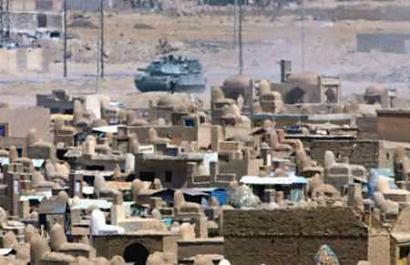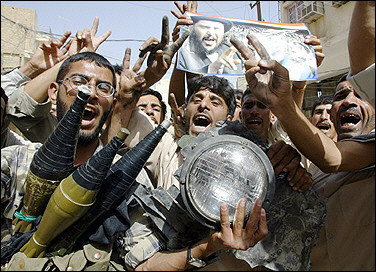|
U.S. tanks thrust into cemetery in Iraq holy city
(Agencies)
Updated: 2004-05-15 09:19
U.S. forces intensified their war against Iraqi cleric Moqtada al-Sadr Friday, sending tanks into Najaf's vast cemetery to blast guerrilla positions on sacred ground in the holy city for the first time.

A U.S. Army tank moves into the site of the ancient cemetery in Najaf, May 14, 2004. U.S. forces intensified their war against Iraqi cleric Moqtada al-Sadr, for the first time sending tanks into Najaf's vast cemetery to blast guerrilla positions among its tombs. [Reuters] |
Explosions and gunfire rocked Najaf for six hours and there was fighting around the main police station, less than a mile from some of the holiest Shi'ite shrines.
Sadr aides showed journalists three holes in the gilded dome of the Imam Ali mosque, the most sacred. Each side blamed the other for the damage.
"Let me make it clear we did not attack the shrine of Imam Ali," U.S. military spokesman Brig. Gen. Mark Kimmitt said in Baghdad.
In the evening, Sadr's militiamen attacked the offices of the U.S.-led civilian administration in the southern town of Nassiriya, 235 miles southeast of Baghdad, after taking over the governor's office.
Andrea Angeli, the administration spokesman there, said he was among 20 international staff trapped in the building along with four Italian reporters as Italian troops and Filipino security guards traded fire with the militiamen.
Sadr said he would not dissolve his Mehdi Army and was ready to fight to the end.
"It is a duty to defend sanctities to the last breath," he told Arabic television Al Arabiya. "God willing, there will be time-bombs to protect the shrine (if U.S. forces approach)."
NAJAF CROSSFIRE
In Najaf, officials said four dead and 26 wounded, mostly civilians caught in the crossfire, were taken to hospital. Many more people were believed to have been killed in the cemetery, but their bodies had yet to be collected.

Iraqi militiamen loyal to cleric Moqtada Sadr celebrate in the heart of the holy city of Najaf. The young fighters carry what they say are parts of a destroyed US military armored vehicle. [AFP] |
At least seven U.S. tanks thrust deep into the cemetery, a city within a city covering several square miles where Shi'ites from all over the world wish to be buried within sight of Najaf's sacred shrines.
An aide to top Shi'ite Muslim cleric Grand Ayatollah Ali Sistani called on both U.S. forces and Sadr's militiamen to cease fighting and leave the holy city.
Sadr was able to move out of town and preach his usual anti-American weekly sermon at Kufa, next door to Najaf.
U.S. commanders say they try not to encroach on holy sites, including the Imam Ali shrine where Sadr has taken sanctuary.
Maj. Gen. Martin Dempsey, commander of U.S. forces in the area, said the tanks were reacting to mortar fire from Najaf cemetery and acted "very precisely, in and out."
But U.S. commanders said this week Sadr's "illegal militia" must be disbanded and their patience was wearing thin after more than a month of fighting across southern Iraq.
U.S. patience also showed signs of fraying in Falluja, the flash point town west of Baghdad, after Mohammed Latif, the Iraqi general put in charge of security to end a bloody month-long Marine siege, said he had no plans to disarm insurgents.
"Weapons are not the problem. They are easy to collect," Latif said. "What we need to do is rebuild our country. There is no need for American soldiers."
In Washington, some Western powers pressed the United States to transfer real power to Baghdad on June 30, a transfer which critics say allows only limited self-rule.
The calls were made at a meeting of foreign ministers of the Group of Eight, which was being hosted by the United States.
KERBALA CLASHES
There were clashes between U.S.-led forces and the Mehdi Army in Kerbala, another holy Shi'ite city, where U.S. tanks were less than a mile from the main shrines.
U.S. helicopters dropped leaflets urging militiamen to give up a day after Defense Secretary Donald Rumsfeld visited to Iraq as Washington tried to contain a prisoner abuse scandal.
The U.S. military said Corp. Charles Graner would be the fourth soldier court-martialed for abusing prisoners, facing seven charges, including maltreatment and cruelty.
Graner, facing more charges than any of his co-accused so far, will be arraigned on May 20, the same day as two sergeants who each face five charges.
Friday, the U.S. military said 293 inmates were freed from the notorious Abu Ghraib prison, part of a plan to cut the number of Iraqis held there. Some of those released said they were tortured and abused while held at the jail.
The releases were part of a months-old program that the new commander of the jail said this week would cut the number of inmates to between 1,500 and 2,000 by the end of next month.
About 3,800 detainees were in Abu Ghraib earlier this week.
|